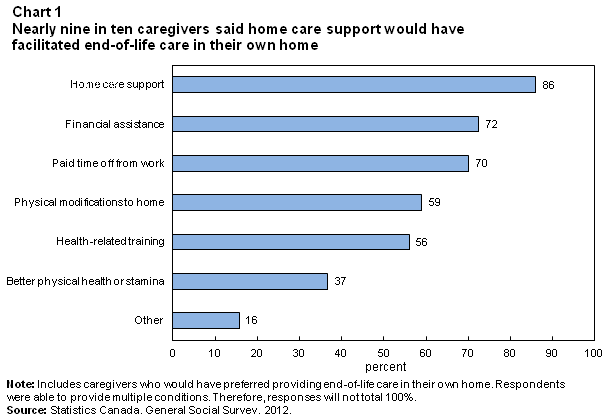End-of-life care, 2012
Archived Content
Information identified as archived is provided for reference, research or recordkeeping purposes. It is not subject to the Government of Canada Web Standards and has not been altered or updated since it was archived. Please "contact us" to request a format other than those available.

End-of-life care, also known as palliative care, refers to providing care for someone who is terminally ill. Information on end-of-life care is based on the 2012 General Social Survey on Caregiving and care receiving.
In 2012, 13% of Canadians (3.7 million) aged 15 and older reported having provided end-of-life care to a family member or friend, at some point in their lives. This could include helping with personal or medical care, assisting with housework, preparing meals, providing transportation to and from medical appointments, managing finances, and other helping activities.
Providing palliative care within the previous year was reported by an estimated 621,000 Canadians or 2% of those aged 15 and older.
End-of-life care was most often a reality for those in their 50s and 60s, with about one in five reporting that they had ever provided palliative care to a parent, spouse, grandparent, other family member or friend. As with caregiving overall, women were more likely than men to have provided assistance to someone who was terminally ill. Over their lifetimes, 16% of women reported doing so, compared to 10% of men.
Providing end-of-life care was sometimes done in the caregiver's own home. This was true for about one-third (35%) of Canadians who had provided care for their terminally ill relative or friend.
For those who did not provide care in their own home, 17% would have preferred this option. These caregivers indicated a number of conditions that could have facilitated care within their own home. Ranking the highest was home care support, with close to nine in ten (86%) reporting that this service would have enabled them to care for their dying family member or friend in their own home (Chart). Other commonly cited conditions included financial assistance to cover additional costs (72%) and time off work with no loss in pay (70%).

One type of support available is 'Compassionate Care leave', where a person can take up to eight weeks leave from paid work to provide care or support to a gravely ill family member or friend who is at risk of dying within 26 weeks. In all, 12% of Canadians who provided end-of-life care took this type of leave. Of those who provided end-of-life care in the last 12 months, 8% reported taking this leave.
Rates of end-of-life care were similar across the country, with few variations between provinces. A difference of two percentage points was recorded for those living in Newfoundland and Labrador, making it the sole province where a significantly higher proportion of people had ever provided end-of-life care (15% versus 13% overall). No provinces had significantly lower rates of end-of-life care.
Data
Additional data from the General Social Survey on Caregiving and Care receiving are available from CANSIM tables 114-0001 to 114-0013. Additional analyses on caregiving are available in the following publications, Portrait of Caregivers, 2012, Portrait of Caregivers, 2012, Family caregiving: What are the consequences?, and Young Canadians providing care.
- Date modified:
